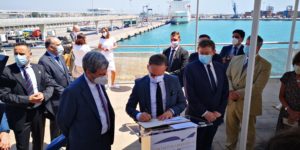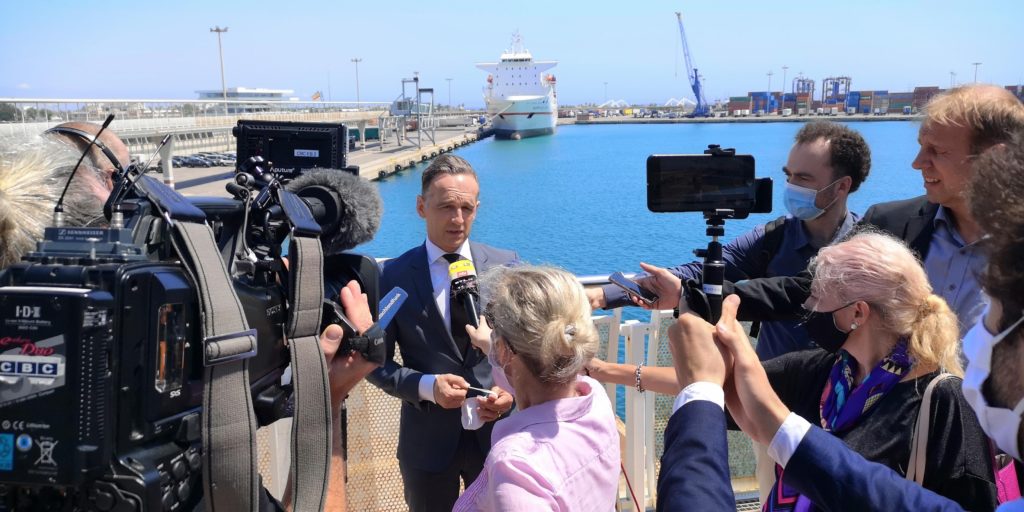
The German Foreign Minister Heiko Maas appreciates the leadership of Valenciaport, a port that is situated between Hamburg and Bremen in comparison to the Germans
Heiko Maas emphasizes the Spanish-German collaboration in tourism: “thanks to these measures adopted by the Spanish government, tourism in Spain can be done in a very safe way”
València, June 23rd, 2020.- The German Minister of Foreign Affairs, Heiko Maas, has been received in the Port of Valencia by the President of the Generalitat, Ximo Puig and the President of the Port Authority of Valencia, Aurelio Martínez. Heiko Maas has shown interest in the Valencian terminals; a port whose potential in the export sector he knows perfectly (his father worked in the Ford factory in Almussafes).
Maas has signed in the Valenciaport’s book of honour and has travelled along one of the gangways through which cruise ship tourists pass to access the ships. From the top floor of the Trasmediterránea terminal, and with a view to the passenger and container terminals, the President of Valenciaport explained to the German Minister that the Port of Valencia closed the 2019 financial year with 5.5 million containers; a figure that places it as the leading and strategic port in Southern Europe, with traffic volumes that range from almost 10 million TEUs in the German port of Hamburg to 4.4 million in Bremen (the second largest port in Germany).
In this sense, Aurelio Martinez explained to the German president that Valenciaport is making an effort in investments and future projects to continue being the great strategic reference of European ports in the Mediterranean. “We are a great port in terms of traffic, efficiency, call times and connectivity and we also want to be a great port in terms of decarbonisation and climate change actions”.
About the port of Valencia, Heiko Maas said that “it is a great port, with a volume of traffic and business that could be placed halfway between the German ports of Hamburg and Bremen, the first and second German port. Between the German and Spanish ports, such as Valencia, there are numerous cooperation and investment projects, and my wish would be to increase this cooperation. There is great potential between the two sides, and that is precisely what we are working for today in Valencia”.

Spain, a safe tourist destination
In response to questions from German journalists about the coronavirus crisis and the tourism sector, Heiko Maas explained that “the Spanish government has taken very drastic measures and has maintained them for a long time and is currently working in collaboration with Berlin to see what kind of measures it can take to carry out a de-escalation with guarantees. We are working to see how tourism will be this summer, and we are seeing very responsible behaviour from Spain. I am very confident that thanks to these measures taken by the Spanish government, tourism in Spain will be able to be done in a very safe way”.
“In fact, -Maas continued- we have established protocols to see models of action in the case of possible positives; and therefore, the Spanish-German collaboration is being extremely fruitful. I am very confident that we can do our part. This summer’s tourism in Spain will be different, but thanks to the measures that have been adopted, it will be a tourism that meets all the guarantees”.
“It is my wish, -Heiko Maas expressed- that all German tourists who want to spend their holidays in Spain behave in a very responsible manner and that they respect all the rules that are being imposed, which are very different from those we knew before. This self-responsibility is very important so that everywhere in Europe we avoid all possible outbreaks”.
Valenciaport, a reference point in Europe
Valenciaport mobilized around 5.5 million containers in 2019, while the main German ports such as Hamburg and Bremen managed 9.3 and 4.8 million, respectively. In terms of tonnes of goods, APV ports operated over 81 million, compared to 136 million in Hamburg and 69 million in Bremen. In the movement of cars, we must point out the more than 722,000 vehicles that were managed in the facilities of Valenciaport, while in Bremen this figure reached 2.1 million, a service that does not operate the port of Hamburg.
The president of the PAV explained to the German minister that “Valenciaport closed the 2019 financial year with 5.5 million containers, placing it as the 5th port in Europe. Valenciaport is the connection of the Mediterranean with more than 1,000
At the forefront of innovative projects
Valenciaport is cooperating with German ports and entities in around fifteen projects related to the reduction of the carbon footprint, mobility of people and goods, cyber security, big data, improvement of logistic connections, environmental sustainability or circular economy, among others. “Cooperation between European ports is essential for Europe to continue to move forward on the path to improving the competitiveness and sustainability of the logistics chain and the entry and exit of goods to other parts of the world, hence the importance of creating synergies and common front to place us at the forefront of ports,” said the president of the PAV.
Thus, among the collaboration projects, it is worth mentioning the COREALIS initiative, with NEC Laboratories Europe, which proposes a strategic and innovative framework, supported by disruptive technologies, including IoT, data analysis, next generation traffic management and 5G, for ports to manage capacity, traffic, efficiency and future environmental challenges. Also noteworthy is the PROUT project, in collaboration with Wuppertal Institut Fur Klima for the improvement of urban mobility of both passengers and goods in cities, or the DATAPORTS initiative to promote data integration for the use of the port community, a project being developed by the APV in collaboration with the University of Duisburg-Essen and Fraunhofer Gessellschaft Zur Foerderung der Angewandten Forschung.
Another outstanding action is the GREEN C PORTS project, together with the Valenciaport Foundation, which aims to achieve, through digitalisation, an increase in the efficiency of port operations, the promotion of the environmental sustainability of the Port and the environmental performance of operations in which the German ports of Bremerhaven and Wilhemshaven also participate. In addition, the LOOP-PORTS project is being developed with the University of Hamburg. This is funded by EIT Climate-KIC and aims to facilitate the transition to a more circular economy in the port sector by creating a Port Network in this area that will provide an innovation ecosystem around port activity and stimulate the dissemination of circular economy initiatives.

